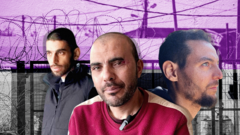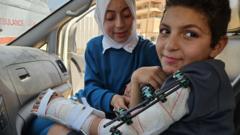In a disturbing report, released Palestinian detainees from Gaza describe severe mistreatment, including torture methods such as chemical burns and electric shocks, in Israeli military and prison facilities. Their testimonies coincide with previous allegations of abuse and highlight the urgent need for independent investigations into the treatment of detainees.
Allegations of Torture and Abuse in Israeli Detention Facilities by Released Gazan Detainees

Allegations of Torture and Abuse in Israeli Detention Facilities by Released Gazan Detainees
Released Palestinian prisoners share harrowing accounts of torture and mistreatment while detained by Israeli authorities, raising serious human rights concerns.
In a recent report, Palestinian detainees who were released back to Gaza have recounted their harrowing experiences of torture and mistreatment during their detention by Israeli military and prison staff. These accounts reveal a disturbing pattern of abuse that raises significant human rights concerns. Among the testimonies is that of Mohammad Abu Tawileh, a 36-year-old mechanic, who described being doused in chemicals, set alight, and physically assaulted continuously during his time in custody.
Five released detainees were interviewed in-depth, having been held under Israel's Unlawful Combatants Law, which allows for indefinite detention without charge. These men, accused of having ties to Hamas, stated they were questioned about the location of hostages and tunnels, despite not being linked to the violent events of October 7, 2023. The men emphasized that they faced violence and inhumane treatment throughout their detention process.
Each detainee detailed their experience of being blindfolded, cuffed, and subjected to severe beatings. Reports include shocking instances of electric shocks, intimidation by dogs, and medical neglect, with some individuals even witnessing deaths and sexual abuse of fellow prisoners. Notably, allegations of being submerged in chemicals and set on fire emerged, with some men revealing the visible scars from these torturous acts.
The Israel Defense Forces (IDF) firmly rejected allegations of systematic abuse, stating that specific complaints would be examined by relevant authorities. The Israel Prison Service also denied any awareness of such claims. However, independent legal experts emphasize that the treatment described directly contravenes both international law and Israeli law regarding the humane treatment of detainees.
Dr. Lawrence Hill-Cawthorne, co-director of the Centre for International Law at the University of Bristol, asserted that many of the allegations presented by the released detainees would meet the threshold for torture under international human rights standards.
The mistreatment reportedly occurred at several locations, including Sde Teiman military barracks and Ketziot prison, which has been scrutinized for its treatment of Palestinian detainees. Interviewees reported being subjected to extreme conditions, such as stress positions, severe restrictions on food and medical care, and humiliating treatment upon arriving at detention centers.
As these detainees reintegrate into life in Gaza, their physical and psychological scars are evident. Many report lasting trauma, with some expressing a desire to leave Gaza altogether, driven by the memories of their experiences in detention. The testimonies of these men align with ongoing concerns raised by human rights organizations regarding the treatment of Palestinian detainees in Israeli custody, underscoring the need for transparency and accountability in detention practices.
Five released detainees were interviewed in-depth, having been held under Israel's Unlawful Combatants Law, which allows for indefinite detention without charge. These men, accused of having ties to Hamas, stated they were questioned about the location of hostages and tunnels, despite not being linked to the violent events of October 7, 2023. The men emphasized that they faced violence and inhumane treatment throughout their detention process.
Each detainee detailed their experience of being blindfolded, cuffed, and subjected to severe beatings. Reports include shocking instances of electric shocks, intimidation by dogs, and medical neglect, with some individuals even witnessing deaths and sexual abuse of fellow prisoners. Notably, allegations of being submerged in chemicals and set on fire emerged, with some men revealing the visible scars from these torturous acts.
The Israel Defense Forces (IDF) firmly rejected allegations of systematic abuse, stating that specific complaints would be examined by relevant authorities. The Israel Prison Service also denied any awareness of such claims. However, independent legal experts emphasize that the treatment described directly contravenes both international law and Israeli law regarding the humane treatment of detainees.
Dr. Lawrence Hill-Cawthorne, co-director of the Centre for International Law at the University of Bristol, asserted that many of the allegations presented by the released detainees would meet the threshold for torture under international human rights standards.
The mistreatment reportedly occurred at several locations, including Sde Teiman military barracks and Ketziot prison, which has been scrutinized for its treatment of Palestinian detainees. Interviewees reported being subjected to extreme conditions, such as stress positions, severe restrictions on food and medical care, and humiliating treatment upon arriving at detention centers.
As these detainees reintegrate into life in Gaza, their physical and psychological scars are evident. Many report lasting trauma, with some expressing a desire to leave Gaza altogether, driven by the memories of their experiences in detention. The testimonies of these men align with ongoing concerns raised by human rights organizations regarding the treatment of Palestinian detainees in Israeli custody, underscoring the need for transparency and accountability in detention practices.























